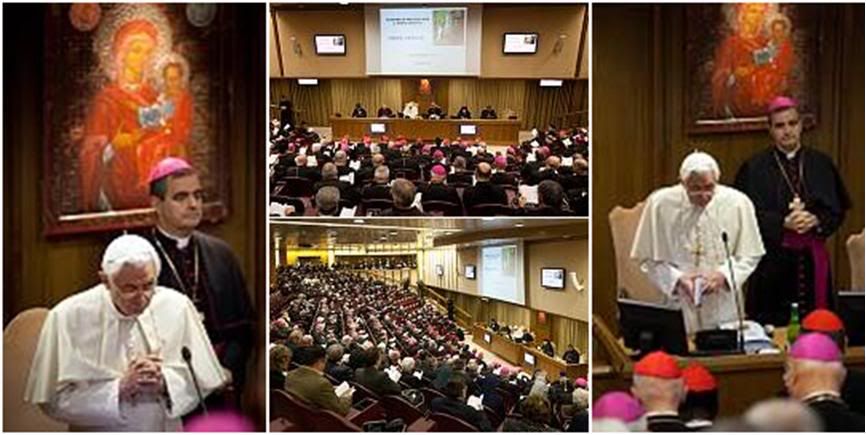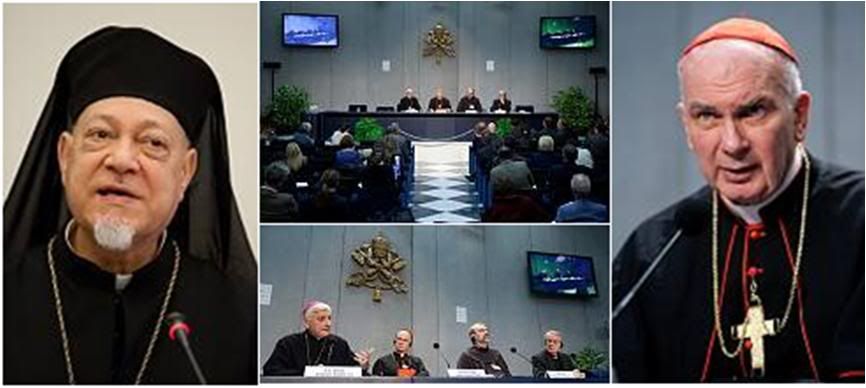

 See preceding page for earlier posts today, 10/19/10.
See preceding page for earlier posts today, 10/19/10.

 BENEDICT XVI AND THE SYNODAL ASSEMBLY
Regretfully I have been unable to make regular postings about the Synodal Assembly, but fortunately, the secretariat of the Bishops' Synod has been very diligent and mostly prompt on posting bulletins, generally twice a day, reporting on the events at the General Congregations (full assembly) held twice a day last week, with summaries (sometimes the full address) of interventions by participants and guests alike.
BENEDICT XVI AND THE SYNODAL ASSEMBLY
Regretfully I have been unable to make regular postings about the Synodal Assembly, but fortunately, the secretariat of the Bishops' Synod has been very diligent and mostly prompt on posting bulletins, generally twice a day, reporting on the events at the General Congregations (full assembly) held twice a day last week, with summaries (sometimes the full address) of interventions by participants and guests alike.
All these are available in English and the other official Vatican languages on www.vatican.va/news_services/press/sinodo/documents/bollettino_24_speciale-medio-oriente-2010/bollettino_24_speciale-medio-oriente-2010_index...
As the Vatican webpages are fairly stable, it is unlikely that these posts will be taken offline at any time in the foreseeable future.
 The Holy Father at the Oct. 18 morning session (Photos by CPP).
The Holy Father at the Oct. 18 morning session (Photos by CPP).
According to the Bulletins, the Holy Father registered a near-perfect daily attendance record so far:
- He was present at each of the morning congregations on October 11, 12, 14, 15, and 18. Oct. 13 was a Wednesday, and that morning, the Synod participants called on Italian President Giorgio Napolitano at the Quirinale, while the Pope held his General Audience.
- He also came back for each of the evening free discussion hours on Oct. 11, 12, 13, 14, and 15.
Strangely, there has not been a single news report about these free discussions, despite the attendance of the Pope.
He was not present at the Saturday morning congregation because he had a number of private audiences. There was no discussion hour on Saturday evening, when the participants attended the Verdi
Requiem performance with the Pope, nor on Monday evening, when the assembly broke up into its working groups who are now drafting the propositions they will submit to the Pope for consideration in his post-Synodal Exhortation.
[There has been no news on when he will be issuing his Post-Synodal Exhortation on the Word of God following the General Synodal Assembly on that subject in 2008. He issued the Post-Synodal Exhortation
Sacramentum caritatis on the Oct. 2005 General Assembly on the Eucharist in March 2007. By that timetable, the document on the Word of God assembly is now overdue. Then there was the special assembly on Africa last year.]
Meanwhile, the Synodal Fathers summarized yesterday the first week of the two-week Synodal Assembly in a full report that can be found on:
www.vatican.va/news_services/press/sinodo/documents/bollettino_24_speciale-medio-oriente-2010/02_inglese/b17_02.html#RELATIO_POST_DISCEP...
Synod Fathers reflect on
first week of deliberations

19 OCT 2010 (RV) - The Post-Discussion Report summarizing the main issues discussed over the past week by bishops attending the Synod for the Churches of the Middle East was read out to the assembly Monday morning. The bishops continued their work in the afternoon, in closed-door, small group sessions.
“We must become people of the Bible” – that’s the essential message behind the post discussion report. An invitation and a challenge to clergy and the faithful in the Middle East to live the Christian witness to peace, justice, communion and honesty.
The report raises the questions of the freedom of religion and of conscience, the equality of citizens before the law, and the importance of the mass media as a useful and powerful tool for communicating the Christian message. Also:
- Catholic education contributes to creating citizens committed to justice, peace and solidarity.
- Peace and development in the Mideast must be encouraged so that Christians will remain in the region.
- By the same token, immigration of Christians [almost all of them as workers] towards the region, particularly from Asia and Africa, poses another pastoral challenge to the Churches.
- Women, the family and young people should be supported and the role of the laity in pastoral and ecclesial life reinforced.
- Monastic and contemplative life should be rediscovered and a “Bank of Priests” and another for lay faithful were suggested to help fill the gaps in zones where they’re lacking.
The report calls the division of Christians a “scandal” that must be healed and the synod should help further communion and unity with the Orthodox Churches
so that one day Christmas and Easter can be celebrated together.
The report favors a two-state solution for the Israeli-Palestinian conflict, rejects anti-Semitism and calls for dialogue at all levels with Jews.
Muslims and Christians should treat “serenely and objectively the subjects which concern the identity of man, justice, the values of a worthy social life and of reciprocity.”
It was also suggested that the dialogue not be limited to moderate currents of Islam but should also engage fundamentalists and extremists who “profoundly” affect the masses.
[Easy to say, but how to do that? The fundamentalists are by nature deaf to any other 'logic' but their own???]
The report concludes with a reminder to bishops that their real job is yet to begin, in communicating what has been accomplished to the faithful back home – and implementing the Synod directives and recommendations.
Synod report summarizes suggestions
for strengthening Church and dialogue
By Cindy Wooden

VATICAN CITY, Oct. 18 (CNS) -- Specific synod suggestions for a common Catholic-Orthodox celebration of Easter, wider authority for Eastern Catholic patriarchs -- including participation in conclaves to elect a pope -- and the need for local dialogue with Muslims and Jews were repeated in the midterm report of the Synod of Bishops for the Middle East.
 Left, Patriarch Naguib; extreme right, Cardinal Foley.
Left, Patriarch Naguib; extreme right, Cardinal Foley.
Coptic Patriarch Antonios Naguib of Alexandria, Egypt, the synod's recording secretary, presented his summary of synod speeches and suggestions Oct. 18 and gave synod members a list of 23 questions to discuss in their small working groups.
The questions were designed to help synod members draft proposals to be presented to Pope Benedict XVI before the synod formally ends Oct. 24 with a Mass.
The need for a common date for Easter, and also for Christmas, "is a pastoral necessity," especially because of the numbers of marriages between Christians of different churches and because it would be "a powerful witness" of Christian unity in the region, the patriarch said.
The continuing emigration of Christians from the Middle East, especially the emigration of the young and the well-educated, threatens the very survival of Christianity in the region in which it was born, the midterm report said.
War, conflict, economic and political pressures all have combined to urge people to flee the region, the report said. Christian leaders and all people of good will must pressure their political leaders to work for a resolution of the Israeli-Palestinian conflict and an end to the ongoing violence and instability in Iraq, it said.
However, Patriarch Naguib said, "the danger that threatens Christians in the Middle East comes not only from their minority status, or external threats, but above all from their distance from the truth of their Gospel, their faith and their mission" to be Christian witnesses.
"The true tragedy of man is not when he suffers because of his mission, but when he has no more mission and thereby loses the meaning and purpose of his life," it said.
Patriarch Naguib told the synod, "The number of persons in the Church is not as important as their living their faith and effectively transmitting the message" of God's love for each person.
The majority of Catholics in the Middle East belong to Eastern Catholic churches -- the Chaldean, Coptic, Armenian, Maronite or Melkite churches -- and for many of those communities, there are more faithful living outside the Middle East than inside the region.
Church law gives the patriarchs and synods of the Eastern churches a large degree of autonomy and decision-making power over the territory of their traditional homelands, but gives the Pope jurisdiction over the Eastern churches' dioceses in the rest of the world.
In their speeches to the synod Oct. 11-16, members "emphasized the need" to extend the jurisdiction of the patriarchs to all members of their churches, Patriarch Naguib said.
"How can one be 'father and head' of a people without a head?" he asked, adding that "communion is a personal relationship, animated by the Holy Spirit," and not a jurisdictional relationship dictated by geography.
The heads of the Eastern churches contribute to making the Church truly catholic, he said, so the patriarchs should be automatic "members of the college that elects the Supreme Pontiff" without having to be named cardinals first, he said.
Chaldean Bishop Antoine Audo of Aleppo, Syria, told reporters Oct. 18 that the patriarchs are not looking for power and influence, but for a better way to express to all Catholics the communion that exists between them and the Pope, and the importance of the papacy for Eastern Catholics as well as for those of the Latin rite.
Throughout the synod, members discussed the need for full freedom of religion and conscience, for democracy and for a greater separation between government and religion throughout the region.
But members thought the synod organizers' use of the term "positive secularism" to describe religion-state separation was problematic, because secularism implies ignoring or even denying the religious values of a nation's people, the patriarch said.
"We prefer the term 'civic state'" to describe a political system based on "respect for each person and individual freedom, equality and full citizenship, the recognition of the role of religion -- even in public life -- and moral values," he said.
Despite the rise since the 1970s of "political Islam" in the region, Catholics must remember that Christians and Muslims lived side by side in the region for 14 centuries, often sharing the same challenges and tragedies.
"We must not argue with Muslims, but love them, hoping to elicit reciprocity from their hearts," Patriarch Naguib said.
At the same time, the synod called on Catholics to demonstrate awareness of sharing their destiny with their Muslim and Jewish neighbors by not focusing only on defending the rights of Christians, but engaging in work for the common good, he said.
The synod report called for continued support for Catholic schools in the Middle East, because the schools not only educate Catholics and give them the tools they need to survive in the region, they also are the primary place where the church shows that it is ready, willing and able to work with Muslims for the good of society and where Christians and Muslims learn to live and work side by side.
Cardinal John P. Foley, grand master of the Equestrian Order of the Holy Sepulcher of Jerusalem, told reporters the Catholic schools in the Middle East "make a great contribution to mutual understanding," and helping the schools is a powerful, concrete investment in a future where members of different religions work together.
[Modificato da TERESA BENEDETTA 20/10/2010 05:16]